Hãy nhập câu hỏi của bạn vào đây, nếu là tài khoản VIP, bạn sẽ được ưu tiên trả lời.

Living in the countryside is very unique. Although many people think that the country is not good or not well-provided, it's still one of the best options for healthy living. In the countryside, first, it's the low cost of living. Secondly, unlike the cities, the country provides fresh air and green spaces. Last but not least, the villagers are always kind and friendly, willing to help each other no matter what.
Some people really prefer to live in the downtown because of its facilities. But I prefer to live in the countryside because of many reasons.
First of all, the life in the city makes me uncomfortable, I cannot bear to live in cramped conditions with the hustles and bustles. We do not have fresh air to breathe, do not have a space for our children to play and for us to relax. It is really tiring and upset to wait for hours because of traffic jams.
Secondly, the pollution because of smogs and dusts and noise can make me feel sick. Moreover, I do not feel safe to live in the city because the criminal situations are rising. , We feel worried when we go out each time.
Thirdly, Nowadays, the conditions of the countryside are better and better, the gap between the cities and the countryside is narrowed day by day.
I love the silence, I love fresh air. I love the good relationships of people. so I love to live in countryside.

Hi Tom,
I hope this email finds you well. I wanted to share an exciting opportunity with you – the upcoming Ok Om Bok Festival! It's a vibrant and culturally rich event that celebrates the traditional harvest season.
Participating in the festival will give you a chance to immerse yourself in the local culture, witness mesmerizing rituals, and enjoy delicious traditional foods. The festival's colorful atmosphere and warm community spirit make it a unique experience.
Don't miss out on this fantastic cultural celebration! Your presence would undoubtedly add to the festive cheer. Looking forward to seeing you there!
Best regards,
Xuan Thanh
Dear Tom,
I'm happy to hear that you are going to join the Ok Om Bok Festival in Soc Trang Province. As I know, Ok Om Bok Festival, also called Moon Offering Festival is traditional folk festival has existed for a very long time of Khmer people in Mekong Delta, especially 2 Tra Vinh and Soc Trang Provinces.
Here, I have some advice for you to dos and don'ts at that festival. First, I think you should wear trainer or shoes and comfortable clothes because maybe you must be walk a lot. And then, remember to bring some bottle of water, it will be hot in Soc Trang so you will get thirsty.
Also, I should remind you that you must not to litter on the ground or run away from your father. It's an big festival so it will be crowded, you should be careful to not get lost. Anyway, I hope you will have a great time with your dad and enjoy the festival.
Cheers
In the picture, the girls like taking photos in their free time. I like listening to music and I often do it in my free time.
(Trong bức tranh, những cô gái thích chụp những bức ảnh vào thời gian rảnh của họ. Tôi thích nghe nhạc và tôi thường xuyên nghe nhạc trong thời gian rảnh của tôi.)
the girls like taking photos in thier free time
i like playing online game in my free time
three time a weeks

Đáp án:
A: There is too much noise here!
B: This store has a lot of snacks, but I don't have enough money.
Hướng dẫn dịch:
A: Có quá nhiều tiếng ồn ở đây!
B: Cửa hàng này có rất nhiều đồ ăn vặt, nhưng tôi không có đủ tiền.
Hướng dẫn dịch đề bài:
Lượng từ với danh từ đếm được/ không đếm được
Chúng ta có thể sử dụng các danh từ đếm được/không đếm được với các từ định lượng: lot of/a lot of, too much, too many, và not enough để nói về số lượng.
- lot of/a lot of... có nghĩa là một lượng lớn cái gì đó.
- ….are too many... có nghĩa là số lượng của một thứ gì đó có thể đếm được nhiều hơn bạn muốn.
- ....is too much... có nghĩa là số lượng của một thứ gì đó không đếm được nhiều hơn bạn muốn.
- .... not enough... có nghĩa là số tiền ít hơn bạn muốn.
Lưu ý: too much, too many, và not enough có nghĩa tiêu cực.
There are lots of people.(Có rất nhiều người.)
There is too much work to do.(Có quá nhiều việc phải làm.)
There are too many cars on the road.(Có quá nhiều xe trên đường.)
There isn't enough time to play. (Không có đủ thời gian để chơi.)

I think teenagers are as stressed as adults because of many reasons related mainly to school, friends and family.In fact, doing well at school involves a lot of pressure, because they have to complete school work, projects and reports and study hard for exams.Then, there is also the stress of having a social life and being accepted by their peers in popular groups in addition to the physical stress which result from some emotional and physical changes which can leave adolescent confused and stressed.Finally, we can mention also the stress that comes from family problems and sibling rivalry.To sum up, we can say that a lot of reasons can led teenagers to stress, which can provoke violent reactions, depression and health problems.
According to me, there are a lot of reasons of stress and pressures. Firstly, as a student, i have to complete a number of assignments at school and at home as well. Moreover, besides subjects, we also have many activies after school, such as physical activities. Students sometime feel under pressures of acheiving goal in sporty competition. Finally, we can mention the stress come from family problems, such as parent’s fight, divorce. All in all, the over-expectation from parents and the overwhelming study scheme at schools are to blame for the significant problem of students’ stress. It is, therefore, suggested that both schools and parents must take actions to cope with this problem effectively.
I think teenagers are as stressed as adults because of many reasons related mainly to school, friends and family.In fact, doing well at school involves a lot of pressure, because they have to complete school work, projects and reports and study hard for exams.Then, there is also the stress of having a social life and being accepted by their peers in popular groups in addition to the physical stress which result from some emotional and physical changes which can leave adolescent confused and stressed.Finally, we can mention also the stress that comes from family problems and sibling rivalry.To sum up, we can say that a lot of reasons can led teenagers to stress, which can provoke violent reactions, depression and health problems.
According to me, there are a lot of reasons of stress and pressures. Firstly, as a student, i have to complete a number of assignments at school and at home as well. Moreover, besides subjects, we also have many activies after school, such as physical activities. Students sometime feel under pressures of acheiving goal in sporty competition. Finally, we can mention the stress come from family problems, such as parent’s fight, divorce. All in all, the over-expectation from parents and the overwhelming study scheme at schools are to blame for the significant problem of students’ stress. It is, therefore, suggested that both schools and parents must take actions to cope with this problem effectively.

Đáp án:
1. room | 2. nature | 3. peace | 4. fresh |
5. fresh | 6. vehicle | 7. entertainment | 8. facility |
Hướng dẫn dịch:
giải trí - những thứ mọi người có thể làm để vui vẻ
tự nhiên - động vật, thực vật và những thứ không làm ra từ con người
tiếng ồn - âm thanh khó chịu hoặc lớn
bình yên - trạng thái bình tính hoặc lặng yên
tươi - sạch hoặc mát (ví dụ: nước, không khí)
xe cộ - một thứ được sử dụng để vận chuyển người hoặc vật từ nơi này sang nơi khác, chẳng hạn như ô tô hoặc xe tải
phòng - có sẵn không gian trống để sử dụng
trang thiết bị - một tòa nhà, dịch vụ, thiết bị, v.v. với một mục đích cụ thể
1. Tôi muốn có một khu vườn lớn vì tôi cần chỗ để trồng rau.
2. Nhiều người đến thăm Hawaii vì tự nhiên của nó. Nó có rất nhiều bãi biển và núi đẹp với cây cối và các loài chim đầy màu sắc.
3. Điều tôi thích nhất về thư viện không phải là sách. Đó là yên bình và yên tĩnh.
4. Không khí bên ngoài thật trong lành. Chúng ta hãy đi dạo!
5. Tôi sống gần sân bay, và tôi không thể ngủ vào ban đêm vì tiếng ồn quá lớn!
6. Tôi phải sử dụng phương tiện giao thông công cộng hàng ngày vì tôi không có phương tiện đi lại.
7. Công viên giải trí và nhà hát là hai ví dụ về giải trí trong thành phố của tôi.
8. Tôi nghĩ rằng bệnh viện mới là cơ sở quan trọng nhất trong thị trấn của chúng tôi.

1. flood | 2. tornado | 3. vocalnic eruption |
4. storm | 5. landslide | 6. erathquake |

Gợi ý:
In the picture, the boy is thinking about playing soccer and the girl is planning to play the piano on the weekend. I usually go to the mall with my friends every weekend.
Hướng dẫn dịch:
Trong bức tranh, bạn nam đang nghĩ đến việc chơi đá bóng và bạn nữ đang lên kế hoạch cho việc chơi đàn vào cuối tuần. Tôi thường cùng bạn bè đi khu thương mại vào mỗi cuối tuần.)

Gợi ý:
The two pictures talk about two places, the city and the countryside. The city is rich, but the environment is polluted. The countryside is poor but the air is very fresh.
Hướng dẫn dịch:
Hai bức tranh nói về 2 nơi là thành phố và nông thôn. Thành phố thì giàu có nhưng lại bị ô nhiễm môi trường. Nông thôn nghèo khó nhưng không khí rất trong lành.

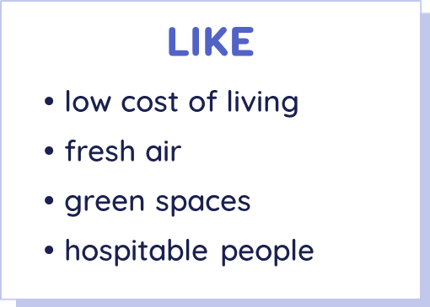
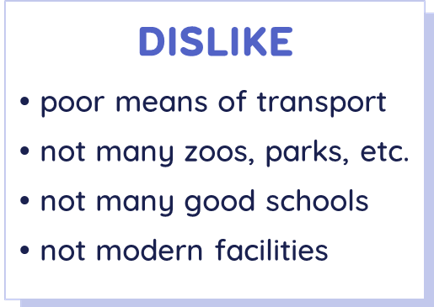
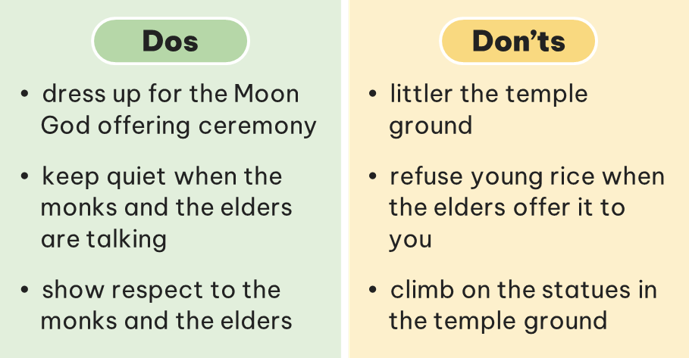

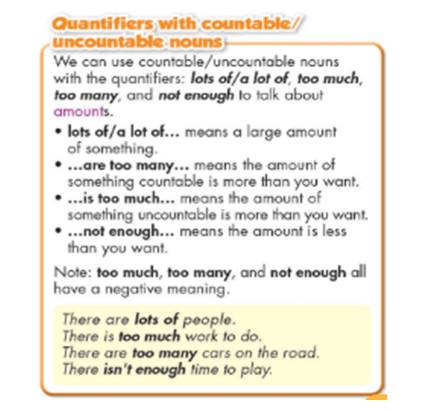
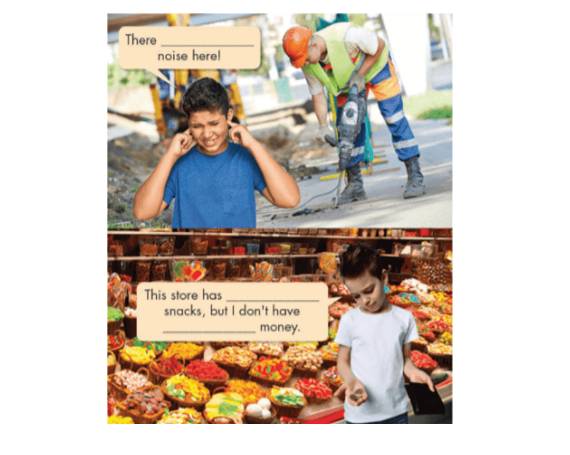
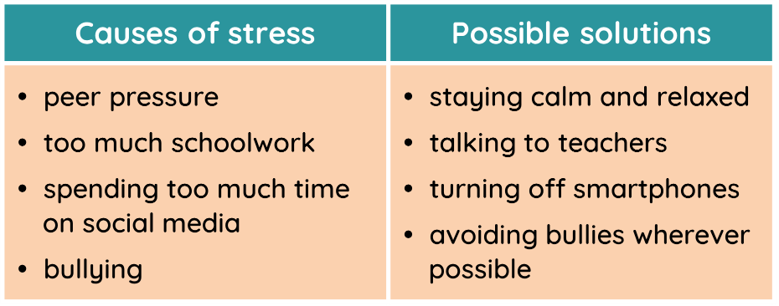
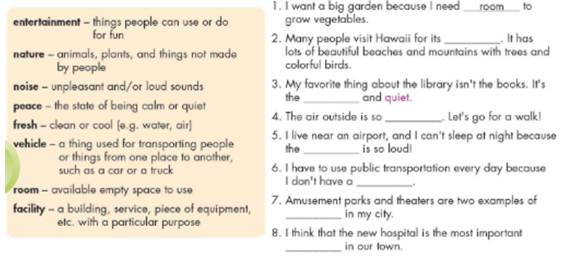




Looking at the words in blue in the dialogues in exercise 2, I see that adverbs of frequency are positioned after the subject and before the main verb in a sentence.
(Nhìn vào các từ màu xanh lam trong các đoạn hội thoại ở bài tập 2 em thấy rằng các trạng từ chỉ tần suất thường đứng sau chủ ngữ và đứng trước động từ chính trong câu.)
More adverbs: always, normally, usually, often/frequently, sometimes, seldom/rarely, and never…
(Thêm một số trạng từ là: always (luôn luôn), normally (thông thường), usually (thường thường), often/frequently (thường xuyên), sometimes (thỉnh thoảng), seldom/rarely (hiếm khi), and never (không bao giờ)...)